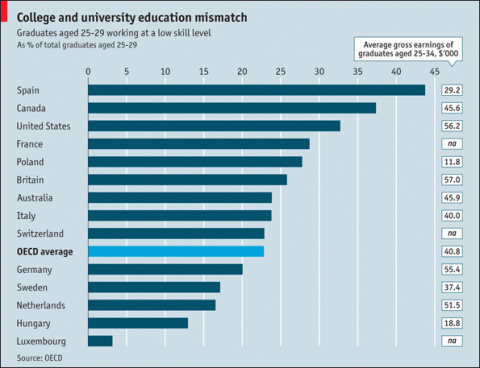Young university grads having a hard time in the Canadian labour market
While we’re talking about labour markets, here’s a blog post I wrote for CCPA’s PolicyNote blog.
—
An interesting chart from The Economist shows that over a third of young university graduates in Canada end up working in low skilled jobs. In fact, Canada is second only to Spain in the OECD when it comes to young grads employed in jobs that fail to take advantage of their skills.
There is certainly lots of anecdotal evidence that young graduates are finding it harder and harder to get jobs in their fields these days. I have several friends with degrees who are now serving in restaurants or working in grocery stores. Those lucky enough to get jobs that use their skills often have to contend with short contracts that provide few benefits and little job security. Getting a permanent full-time position after university is almost unheard of these days.
This graph is the first piece of quantitative evidence I’ve seen on the issue, and it raises serious questions about the prospects of young grads in the labour market.
Canada has a large low-wage sector, which has persisted despite economic growth and our increasingly better-educated workforce.
The graph above shows that there are some very well educated workers toiling in the low-skilled low-wage sector in Canada. Telling people to get more education is not a good solution to working poverty. It’s time to take a look at the demand side of the equation.
Canada invests little in research & development and is exceedingly focusing its export strategy on selling commodities with virtually no value-added manufacturing on top. Coincidence? I think not.


Last time I checked the wage gap between younger and older workers was still failing to close, even though echo baby boomers are by far the best educated in our history. Why? You are absolutely right – the supply greatly exceeds the demand. Increasing educational attainment is not the solution to our job market woes,
Anybody have a breakdown on how earnings vary by field of study?
Unfortunately grads are finding it tough to get jobs that pay what they want. It’s not there are no jobs, it’s just that if you can’t be rich right away it’s not worth getting a job.
Earnings or employment mismatch by field of study would be very interesting. I’ll see if I can find any numbers on that.
But these would only be relevant to our discussion if there were large cross-country differences in the share of graduates by field of study (say, arts, science, applied science, etc).
Is your hypothesis that that more people in Canada choose fields like fine arts than in Luxemburg or Sweden and this drives the differences in rates of Starbucks-employed young grads?
I don’t have a hypothesis yet, but data on field of study, by country, and participation in apprentice programs, colleges, and universities, by country, might be enlightening.
As someone who has obtained an MA recently (in history of international relations), this definitely reflects my experience. I’m currently working on a short term contract at a software company for $10 an hour, and there are a fair number of other recent university grads at the company who just can’t find better paying work.
Nonetheless, something like an industrial and research policy couldn’t hurt.
People I know who got degrees in the sciences, like biology or physics, are either making lousy money or had terrible time getting jobs in their fields or both. Guy I know working in cancer research, smart guy with a doctorate in molecular biology working in his field, was making less than I do (and I’m a union clerk making almost precisely median wage) with diddly benefits, and just got laid off along with basically his entire lab. This seems a not uncommon story. We don’t have many good jobs for scientists, even in the “sexy” fields. That’s because we’re a branch plant economy and have let go of any pretensions we may once have had to independent industrialization.
“That’s because we’re a branch plant economy”
Actually that was the last industrial policy Which ended with the signing of the FTA. The new policy could be described as a “neo-staples economy with a FIRE hub.”
Hey all,
I am wondering if anyone else is having a hard time finding engineering (or other skilled) jobs. I have been looking for a job for more than a year now and applied to almost 200 postings. I have networked, emailed and sometimes even cold called. I landed interviews with 2 companies and lost in the 2nd rounds to more educated and experienced people; the jobs I applied to require 0-2 year(s) experience. I am hitting rock bottom confidence wise and I am starting to think that my profile is the problem:
– GMAT 700 (90th percentile)
– B.Sc. from McGill (GPA: 3.00/4.00)
– B Eng. from Concordia (GPA: 3.71/4.30)
– 8 month work as a manager of small retail stores
– 4 months internship in mechanical engineering
– 4 months internship in IT business analysis
– 8 months internship in product and engineering strategy, aerospace industry
– 2 month volunteer project management consultant for non-profit organizations
– …
Meanwhile, my friends in accounting and finance have no problem landing jobs. I don’t get it! Does anyone else have this dilemma? Is all my hard work worth nothing? Is engineering a doomed profession in Canada?
Your comments are appreciated. Thanks
Jon
It seems we are experiencing a mismatch with the expectations of most “industry leaders” and politicians. I was also involved in a STEM field (Science, Tech, Enngeneering, Math), but I had to get out of there due to the lousy job prospects.
By the way… pharma companies in the States are already moving their research labs to China. Expect to see this happening here as well. We are just cogs in a machine…